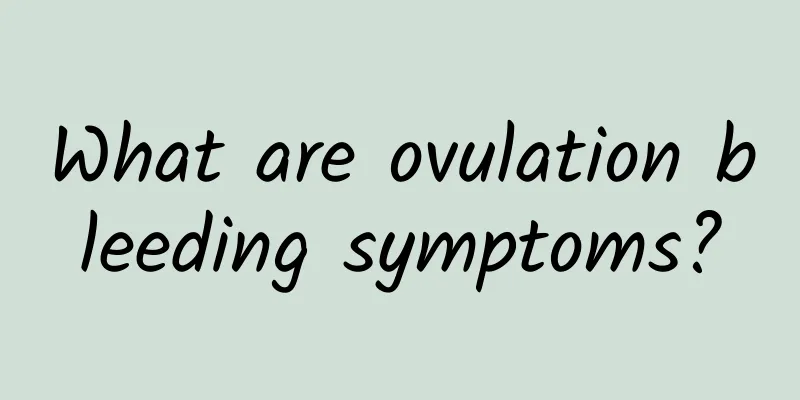What are ovulation bleeding symptoms?

|
Ovulation bleeding refers to minor vaginal bleeding that may occur during a woman's ovulation period due to changes in hormone levels. This condition is usually caused by a brief drop in estrogen levels in some women when the follicle ruptures, resulting in a slight shedding of the endometrium. Ovulation bleeding generally occurs in the middle of the menstrual cycle, around day 14, is brief and mild, and usually does not require special treatment. Normally, the bleeding is light in amount, light pink or brown in color, and lasts for 1 to 2 days. Understanding the physiological background of ovulation bleeding can help eliminate unnecessary concerns. Some symptoms that are often associated with ovulation bleeding include menstrual cramps, mild abdominal discomfort or tenderness, changes in vaginal discharge, etc. The presence of this symptom is caused by hormone fluctuations in the body and is part of a physiological phenomenon. In order to confirm that it is ovulation bleeding, women can make a preliminary judgment by observing the regularity of the menstrual cycle and the characteristics of bleeding. If you are worried that the symptoms are abnormal or accompanied by other discomforts, it is a wise choice to seek medical attention in time. Doctors usually confirm the diagnosis by asking about medical history, performing physical examinations, or performing ultrasound examinations when necessary to rule out other potential health problems. Understanding the physiological background of ovulation bleeding can help eliminate unnecessary concerns. Some symptoms that are often associated with ovulation bleeding include menstrual cramps, mild abdominal discomfort or tenderness, changes in vaginal discharge, etc. The presence of this symptom is caused by hormone fluctuations in the body and is part of a physiological phenomenon. In order to confirm that it is ovulation bleeding, women can make a preliminary judgment by observing the regularity of the menstrual cycle and the characteristics of bleeding. If you are worried that the symptoms are abnormal or accompanied by other discomforts, it is a wise choice to seek medical attention in time. Doctors usually confirm the diagnosis by asking about medical history, performing physical examinations, or performing ultrasound examinations when necessary to rule out other potential health problems. When facing ovulation bleeding, first maintain good hygiene habits to prevent infection. If the bleeding causes discomfort or worry, you can use a warm water bag or ice pack to apply heat or ice to the abdomen to relieve the discomfort. In terms of diet, foods rich in iron and vitamin C such as spinach, eggs, citrus fruits, etc. can help relieve fatigue caused by bleeding. At the same time, getting enough rest and sleep is also crucial. If the bleeding exceeds the normal range or is accompanied by serious symptoms, it is safest to seek medical attention and obtain professional consultation in time. |
<<: Can I take birth control pills if I have dysmenorrhea and cold uterus?
>>: How to check for symptoms of endometriosis
Recommend
Does exercising on an empty stomach help burn fat? Don’t make the mistake of following these 4 sports myths!
You finally started exercising, but are restraine...
What causes cervical erosion and moderate inflammation?
Moderate cervical erosion causes moderate inflamm...
Vulvar infection is an important factor inducing vulvar leukoplakia
Patients with vulvar leukoplakia often experience...
Let's see what tests should be done for irregular menstruation?
As more and more patients with irregular menstrua...
Weeping Woman Flower: The consequences of improper abortion
The most taboo topic for female friends is aborti...
Not only detoxification, but also edema reduction, 7 kinds of superfoods can make you energetic
Want to lose weight, be healthy, and have more en...
Treat the symptoms of vulvar leukoplakia with caution
Itching, pain, erosion, etc. are typical symptoms...
What causes cervical erosion?
Cervical erosion refers to ectopia of the cervica...
How to identify chocolate cysts and what are the hazards of chocolate cysts?
With the increasing pressure of life, more and mo...
Symptoms of irregular menstruation are the most specific manifestations
What are the symptoms of irregular menstruation ?...
The incidence of uterine fibroids is related to the following factors
Uterine fibroids are a gynecological disease, and...
What are the typical symptoms of invasive molar pregnancy?
What are the typical symptoms of invasive molar p...
When is the best time to treat cervical erosion in women? It is recommended to treat cervical erosion in women during these periods
The best time to treat cervical erosion is to get...
How to regulate diet for women during menopause
During menopause, you need to pay attention to so...
Should your knees not go beyond your toes when squatting? Expert: 3 principles for correct squats!
Whether it is to improve athletic performance, sc...









